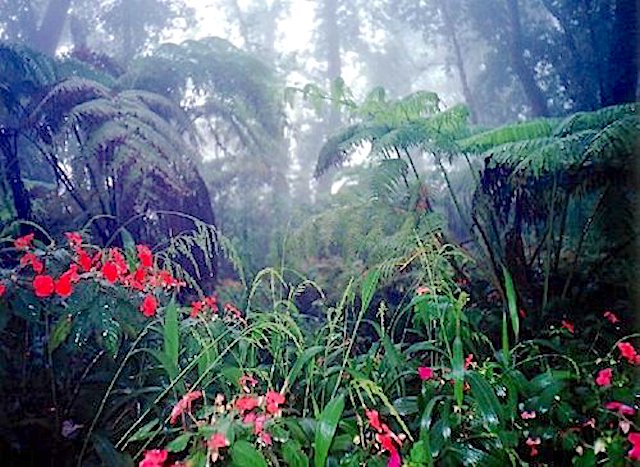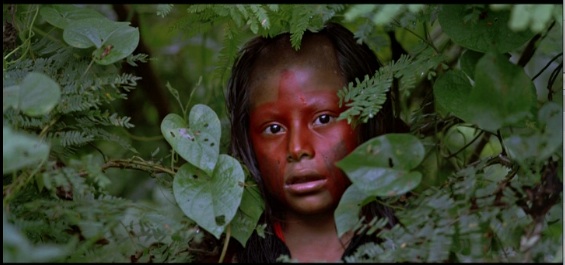This is a modestly revamped version of a thought experiment I wrote five years ago entitled Several Short Sentences About Earth’s Distant Future. At the time it provoked a lot of interesting and mostly positive comments, so I thought I would update it to reflect how my thinking has evolved since then.

image: earth during the eocene epoch, the last time the average surface temperature was 25C, via bbc nature
Imagine this:
- Imagine that, a few millennia from now, down the steep slope that followed Peak Everything, the sixth Great Extinction is finally winding down. The pace of species extinction is slowing, and landscapes, while still often showing the signs of many recent ecological catastrophes due to ongoing tumultuous climate change, are beginning to show more patterns of succession. Our lovely planet has been through this kind of change many times before: At least twice it’s been choked in dust after meteorites or volcanoes that produced a global night that lasted a year and soaked the planet in a deluge of rain with the pH of battery acid. At least once it’s been totally encased, pole to pole, in a sheet of ice miles thick.
- Imagine that this Future Earth looks about as different from the way it did in the 21st century as it did the last time the average surface temperature was 25C rather than 15C — during the early Eocene epoch about 50 million years ago. Imagine that more than half of the planet is therefore now desert, including the Western US, Southern Europe, the Western 2/3 of all tropical areas, and all of the areas that were already desert in the 21st century. Much of the rest of the planet is now rainforest, subject to torrential and relentless monsoons, including former Arctic and Antarctic areas. There are no ice sheets or glaciers now. Rising sea levels have engulfed the formal coastal areas and reduced overall planetary land mass by about 20%, and coasts are now mostly steep and mountainous.

image: depiction of eocene rainforest in the antarctic, from this site, original source uncredited
- Imagine that human population has declined to about 50 million, and is still declining, though much more slowly than during the earlier stages of the Great Extinction. The remaining humans have abandoned all technologies, in part because there is no cheap accessible energy to power them, and in part because with a population now so small and declining (and hence abundant food and warm places to live), there is no real need for technologies for a full and healthy life. Population is still declining because humans are just not naturally well-adapted to very hot or changeable climates, whereas many of the succession species that now feed on humans (jaguars and crocodiles, for example) are much better adapted to prevailing climates. Nuclear radiation from abandoned 21st century power plants has also created ongoing birth rate and illness problems for humans and other species.
- Imagine that humans have readapted to living in the trees (because it’s safer and more comfortable), to gathering rather than growing food (because it’s healthier, more reliable and easier), and to a vegetarian and insect diet (because it’s better suited to our digestive system and more accessible in post-tool-use societies). Humans still look much like they did in the 21st century (and, for that matter, much like they have for the past million years), but they behave much differently. They have given up abstract languages because such languages are no longer of value or use, though they can communicate essential messages very accurately through vocalizations (whistles, calls and songs) and gestures. They retain a passion for art and music and practice these extensively. They live in small, autonomous tribal cultures, each with a territory large enough to provide abundant food even when catastrophic climate events occur, and little or no contact with adjacent human cultures, which are, as a result, very diverse. With a small and declining population, migration outside each tribe’s established territories is (except after local climate disasters) neither necessary nor wise.

image: from the documentary film baraka
- Imagine that such humans have lost their sense of time, again because they have no need for it. They live entirely (except for brief periods when under attack by predators) in the present, joyfully, in the moment. They have, of course, memories (so do most creatures) but their minds, without clocks, calendars and abstract language, now evolve differently from the way they did in the old “civilization” times, so they cannot and do not dwell on the past, nor fear nor long for the future. They live lives of great joy, leisure and abundance, and are unaware of the trajectory that will inevitably lead, many millennia hence, to their ecologically maladapted species’ slow and final extinction. And they are unaware of how humans live/lived in other places and times. It doesn’t concern them. They do not fear death; they accept it. Their curiosity is focused on here, and now.
- Imagine that such humans have begun to evolve cultural and coping characteristics more aligned with their forest-dwelling bonobo cousins than their savannah-dwelling chimp cousins. Their best-adapted societies are peaceful, gentle, matriarchal, affectionate, and egalitarian, and resolve internal conflicts and stress through embrace, caress, and sexual calming methods rather than through the expression of violence.
- Imagine that, despite the apparent similarities between these post-civilization humans and prehistoric tree-dwelling humans, there are a number of qualities that clearly distinguish them. These differences are not physical but behavioural, due to differences in selected genetics, learned behaviours passed between generations, and differences in environment. Post-civilization humans are still not as intuitive as prehistoric humans, but they are more imaginative and hence more playful. They are more empathetic, because they still pass on the embodied grief of having experienced massive suffering and hardship just a hundred generations ago. They still retain vestiges of skill at abstraction and capacity to synergize, that comes through in and is practiced in their art and music composition. They also ironically retain vestiges of competitiveness, even though this no longer serves a useful purpose. While they have varied embodied and enculturated characters, like babies and wild creatures they do not perceive of themselves as separate from all-that-is, or of life having any start or ending, boundaries, purpose or meaning. They are just one with everything.
Imagine that.
This is a future freed from the terrible affliction of “consciousness”. Yet it is the opposite of dull. It is life full on, eternal, vivid, wondrous and endlessly new. It is intuitive, sensuous, fearlessly wild, passionate, and unveiled by the brain’s abstraction of what is and isn’t real.
When I imagined this five years ago, it was impossible for me not to add that, despite the hopelessness of preventing civilization’s collapse and the inevitability of a subsequent long road back to planetary sanity, “we” needed to imagine what we could do now to “prepare us to cope better, to be hurt less, to do less harm”.
I no longer have such conceits. We can and will only do our best, in our own way, in the moment, as events unfold. But while I no longer profess to offer advice or suggestions about what “we” should do, the above flight of fancy fills me with questions. So, in lieu of answers, here are some questions I am thinking about:
- What might it be like to be truly wild, free of the terrifying illusion that we are separate and in control of our own fate?
- Why is it so hard to imagine a future utterly different from anything we’ve known (we tend to imagine the future being like the present “only more so”, or, even worse, imagine it being like the recent past played in reverse)? Why does the idea of future human societies that use substantially no technology, have no abstract language, and aren’t incessantly violent, strike us as so preposterous, even impossible?
- Is there something in the essential nature of the human animal and its oversized brain that makes us inevitably dissatisfied with just being, makes us endlessly want and strive for more, disconnects us from the rest of life with which we’re co-dependent, and inevitably fosters overreach, hierarchy and struggle with our own kind? These would seem to be evolutionary disadvantages.
- Why do so many want to live in cities? It wasn’t always that way — what’s changed?
- Our art, languages, dance and music, and the way we adorn our bodies, demonstrate the enormous cultural diversity of our species, despite the effects of our modern monolithic industrial culture. Why do we strive so desperately to make everyone and everything the same? And, with enough time and enough distance between them, how staggeringly and delightfully different might the many tiny far-flung cultures of humanity millennia from now evolve to be?
I watch the body language of the fawns that come each evening to nibble at the edges of my garden and sleep in the secluded mossy patches of my back yard, for clues. I listen to the intricate songs of the birds that feed outside my window, and wonder. I look into the faces of purring cats, crows huddled together, the astonished looks of babies, for signs of what is really going on.
They’re not telling.





Thank you for your content-rich weblog. We will never meet in person, but your written reflections have given me endless gifts of inspiration. In all my years of surfing the Web, I have yet to run across a more skilled or more profound expression of the informed heart.
Remarkable parallels to a book I read ages ago, https://en.wikipedia.org/wiki/The_World_Without_Us
by Alan Weisman, and of course James Lovelock’s “Revenge of Gaia”
Yet the human race is blithely on their way down the track you describe …
Most of your description makes sense, and to me seems likely. One area in which I think it is erroneous is your thoughts about language and cultural things related to language. As a sociologist with extensive training in anthropology (and having taught cultural anthropology for decades), all the evidence points to humans having rich and complex languages with elaborate myths, tales, jokes, stories told in those languages for at least 500,000 years. Certainly, all studies of foraging societies from the 1800’s to the present show that foragers are extremely verbal and spend much greater time in conversation than industrial people do, telling stories about the hunt, the days activities, the ancestors, the spirits, the world of nature, telling jokes, singing and dancing. In a world without writing and books, all knowledge is verbal. Foraging societies have HUGE stores of knowledge about plants, insects, animals: what is safe, what is dangerous, what is used for which purposes. Most modern industrial people may pass through nature dumbly, but foragers do not. They know intimately about every aspect of their environment and all the species found within it, and they pass that information on to their children. Nor is there anything in anthropological research to suggest that the “selves” of foragers or horticulturalists are any less well formed than those of folks in industrial societies – to think that is a conceit of industrial man. Self is situated entirely differently in a communal society, it exists within the web of kinship, band and clan, but it still exists.
Do you believe that there are no coincidences in life? Everything happens for a reason. Every person we meet have a roll in our life, either it is big or small. Some will hurt, betray and make us cry. Some will teach us lesson, not to change us, but to make us to be a better person.